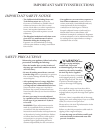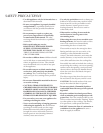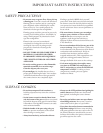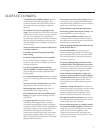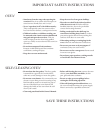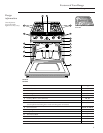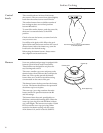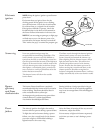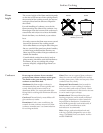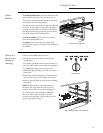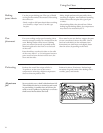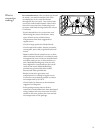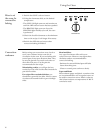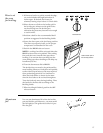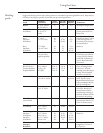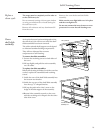
Surface Cooking
Stainless Steel Range
Note:
The flame size on a gas burner should match the
cookware you are using.
12
Cookware
Do not operate a burner for an extended
period of time without cookware on the grate.
The finish on the grate may chip without
cookware to absorb the heat.
Aluminum: Medium-weight cookware is
recommended because it heats quickly and
evenly. Most foods brown evenly in an
aluminum skillet. Use saucepans with tight-
fitting lids for cooking with minimum amounts
of water.
Cast Iron: If heated slowly, most skillets will
give satisfactory results.
Enamelware: Under some conditions, the
enamel of some cookware may melt. Follow
cookware manufacturer’s recommendations
for cooking methods.
Glass: There are two types of glass cookware—
those for oven use only and those for surface
cooking (saucepans, coffee and teapots). Glass
conducts heat very slowly.
Heatproof Glass-Ceramic: Can be used for
either surface or oven cooking. It conducts
heat very slowly and cools very slowly. Check
cookware manufacturer’s directions to be sure
it can be used on gas cooktops.
Stainless Steel: This metal alone has poor
heating properties, and is usually combined
with copper, aluminum or other metals for
improved heat distribution. Combination
metal skillets generally work satisfactorily if
they are used at medium heat as the
manufacturer recommends.
Wok: A large, professional-sized wok and
wok ring, specially designed for use on this
range, is available from your dealer. Ask for
model ZXWK22Y.
Flame
height
The correct height of the flame mainly depends
on the size of the bottom of the cooking utensil,
the material of the cooking utensil, the amount
and type of food and the amount of liquid in
the utensil.
For safe handling of cookware, never let the
flame extend up the sides of the cookware. Any
flame larger than the bottom of the cookware is
wasted heat and only serves to heat the handle.
Watch the flame, not the knob, as you reduce
heat.
• For safety reasons the flame must never extend
beyond the bottom of the cooking utensil.
Never allow flames to curl up the side of the pan.
• Be very careful if the pans have plastic handles,
as these large professional-size burners can
flame up on the outside of the pan and melt or
bubble the handles.
• Utensils which conduct heat slowly (such as
glass-ceramic) should be used with medium to
low flames. If you are cooking with a large
amount of liquid, a slightly larger flame can
be used.
Incorrect Correct



